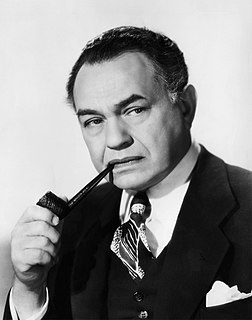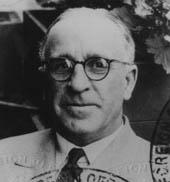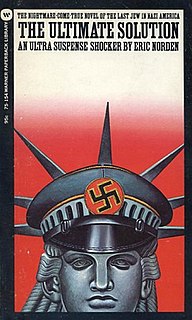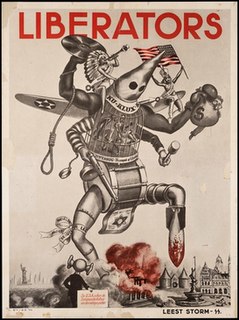
Edward G. Robinson was a Romanian-born American actor of stage and screen during Hollywood's Golden Age. He appeared in 30 Broadway plays and more than 100 films during a 50-year career and is best remembered for his tough-guy roles as gangsters in such films as Little Caesar and Key Largo.
A gangster is a criminal who is a member of a gang. Most gangs are considered to be part of organized crime. Gangsters are also called mobsters, a term derived from mob and the suffix -ster. Gangs provide a level of organization and resources that support much larger and more complex criminal transactions than an individual criminal could achieve. Gangsters have been active for many years in countries around the world. Gangsters are the subject of many novels, films, and video games.

Melvin Horace Purvis II was an American law enforcement official and Federal Bureau of Investigation (FBI) agent. Given the nickname "Little Mel" because of his short, 5 ft 4 in (163 cm) frame, Purvis became noted for leading the manhunts that captured or killed bank robbers such as Baby Face Nelson, John Dillinger, and Pretty Boy Floyd, but his high public profile was resented by local law enforcement. Purvis asserted he had killed Floyd single-handed, others variously claimed that Floyd had been already wounded, or even that Purvis had ordered Floyd summarily shot dead for refusing to provide information.

The Heroes of Telemark is a 1965 British war film directed by Anthony Mann based on the true story of the Norwegian heavy water sabotage during the Second World War from Skis Against the Atom, the memoirs of Norwegian resistance soldier Knut Haukelid. The film stars Kirk Douglas as Dr. Rolf Pedersen and Richard Harris as Knut Straud, along with Ulla Jacobsson as Anna Pederson. It was filmed on location in Norway.

Major Francis "Frank" Edward Foley CMG was a British Secret Intelligence Service officer. As a passport control officer for the British embassy in Berlin, Foley "bent the rules" and helped thousands of Jewish families escape from Nazi Germany after Kristallnacht and before the outbreak of the Second World War. He is officially recognised as a British Hero of the Holocaust and as a Righteous Among the Nations.

Gunnar Fridtjof Thurmann Sønsteby DSO was a member of the Norwegian resistance movement during the German occupation of Norway in World War II. Known by the nickname "Kjakan" and as "Agent No. 24", he was the most highly decorated citizen in Norway, including being the only person to have been awarded the War Cross with three swords, Norway's highest military decoration.

John Banner was an Austrian-born American actor, best known for his role as Sergeant Schultz in the situation comedy Hogan's Heroes (1965–1971). Schultz, constantly encountering evidence that the inmates of his stalag were planning mayhem, frequently feigned ignorance with the catchphrase, "I see nothing! I hear nothing! I know nothing!".
Underworld is a 1927 American silent crime film directed by Josef von Sternberg and starring Clive Brook, Evelyn Brent and George Bancroft. The film launched Sternberg's eight-year collaboration with Paramount Pictures, with whom he would produce his seven films with actress Marlene Dietrich. Journalist and screenwriter Ben Hecht won an Academy Award for Best Original Story.

General Glory is the name of two DC Comics characters. The persona is mostly used by writers as a parody of Marvel's Captain America with exaggerated "patriotic values" and a sidekick called Ernie, who was similar to Bucky. General Glory first appeared in Justice League International #46 as a 1940s style hero placed in a modern world, resulting in cultural differences and personality issues. Whereas Captain America is patriotic, heroic, and rational, General Glory is so blindly patriotic that it approaches the point of fault, unwilling and psychologically unable to believe that his country or international peacekeeping organizations have a dark side. He was introduced as a comic foil for the jingoistic Green Lantern corps member Guy Gardner in the early 1990s.
Willy Ustad is a Norwegian novelist.

Timewyrm: Exodus is an original Doctor Who novel, published by Virgin Publishing in their New Adventures range of Doctor Who novels. It is a sequel to author Terrance Dicks' 1969 Second Doctor story The War Games as well as the second part of the ongoing four novel Timewyrm narrative.

The Ultimate Solution is a 1973 alternate history novel by journalist and former Playboy interviewer Eric Norden, set in a world where the Axis forces won World War II and partitioned the world between them. The novel is noted for its particularly grim tone. Norden later wrote the 1977 Adolf Hitler-related science fiction novella The Primal Solution.

William Joseph "B.J." Blazkowicz is a fictional character and the protagonist of the Wolfenstein series of alternate history video games starting with 1992's Wolfenstein 3D. An American spy of Polish and Jewish descent, he specializes in one-man missions behind enemy lines. In addition to fighting the regular German army he also frequently encounters bizarre Nazi experiments concerning biomechanical technology and the occult.
Mafia films—a version of gangster films—are a subgenre of crime films dealing with organized crime, often specifically with Mafia organizations. Especially in early mob films, there is considerable overlap with film noir. Popular regional variations of the genre include Italian Poliziotteschi, Chinese Triad films, Japanese Yakuza films, and Indian Mumbai underworld films.

The era of American film production from the early sound era to the enforcement of the Hays Code in 1934 is denoted as Pre-Code Hollywood. The era contained violence and crime in pictures which would not be seen again until decades later. Although the Hays office had specifically recommended removing profanity, the drug trade, and prostitution from pictures, it had never officially recommended against depictions of violence in any form in the 1920s. State censor boards, however, created their own guidelines, and New York in particular developed a list of violent material which had to be removed for a picture to be shown in the state. Two main types of crime films were released during the period: the gangster picture and the prison film.
How Much Is Your Iron? is a short play by German modernist playwright Bertolt Brecht. Brecht wrote How Much Is Your Iron? in [1939] while in exile in Sweden, against the background of the approaching Second World War, following Nazi Germany's annexations of Austria and Czechoslovakia, against which Western powers such as Great Britain and France had at that stage not yet intervened. The play takes a critical look at Sweden's involvement with both Axis and Allied Powers in the build-up to World War Two.

Jakob Bothe, better known by his pen name Jakob Arjouni, was a German author. He received the 1992 German Crime Fiction Prize for One Man, One Murder.

Il gobbo is a 1960 Italian crime-drama film directed by Carlo Lizzani. It is loosely based on the real life events of Giuseppe Albano, an Italian partisan that was one of the protagonists, from 1943 to 1945, of the Roman Resistance against German occupation.

The Nazi Party and its ideological allies used cartoons and caricatures as a main pillar in their propaganda campaigns. Such techniques were an effective way to spread their ideology throughout Nazi Germany and beyond. The use of caricatures was a popular method within the party when pursuing their campaign against the United States, in particular its then-President Franklin D. Roosevelt.

Justice Society: World War II is an American animated direct-to-video superhero film produced by Warner Bros. Animation and DC Entertainment. It is the 41st film of the DC Universe Animated Original Movies. The film is directed by Jeff Wamester and starring the voices of Stana Katic, Matt Bomer, Elysia Rotaru, Chris Diamantopoulos, Omid Abtahi, Matthew Mercer, Armen Taylor, and Liam McIntyre. It tells an original story of the Flash ending up back in time to World War II where he meets the Justice Society of America. The film shares continuity with Superman: Man of Tomorrow and Batman: The Long Halloween.















